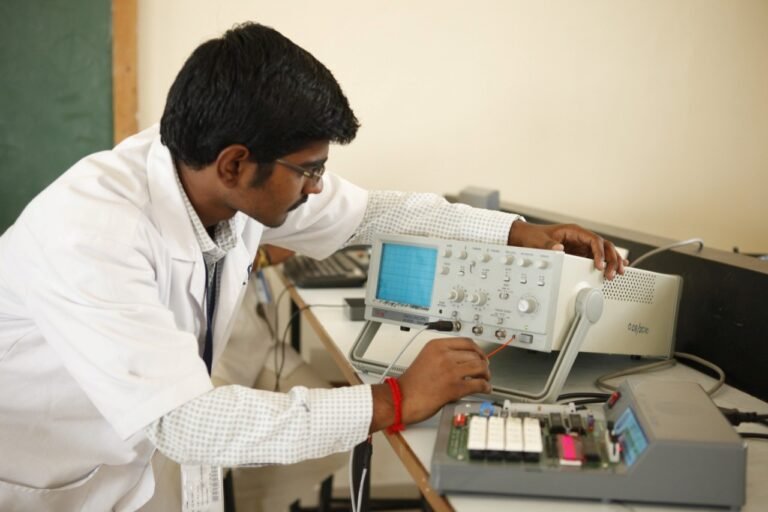About the department

The Department of Electronics and Communication Engineering (ECE) was established in 2009 with the vision of developing the department as a Centre of Excellence in R&D, in the field of Electronics and Communication Engineering and make the hardworking students blossom into meritorious and self-disciplined engineers.
Our mission is to develop innovative and simple instructional material to drive the concepts into the minds of students and infuse scientific temper in the students and guide them towards research in communication engineering. It is also to striving grow a committed group of competent teachers striving for excellence, be it in teaching or research and to develop Collaborative Research and Development linkages with leading organizations in India and abroad.
Courses Offered
UG – B.E. Electronics and Communication Engineering
PG – M.E. Applied Electronics
To be a supreme centre of excellence in the field of electronics and communication by focusing research. Cater to the needs of nation who can address the changes in global scenario and to attain international repute by becoming a trend setter in the field.
- To provide technical education that combines rigorous academic study and the excitement of innovation enabling the students to engage in lifelong learning.
- To develop simple, appropriate and cost effective inclusive technologies which are instrumental in the upliftment of rural society.
- To cultivate a well balanced portfolio of research of the highest quality with a wide range of interests.
- Proactive and adaptive service systems that provide students with a flexible yet solid learning infrastructure.
- To provide the students with a strong foundation in the required sciences in order to pursue studies in Electronics and Communication Engineering.
- To gain adequate knowledge to become good professional in electronic and communication engineering associated industries, higher education and research.
- To develop attitude in lifelong learning, applying and adapting new ideas and technologies as their field evolves.
- To prepare students to critically analyze existing literature in an area of specialization and ethically develop innovative and research oriented methodologies to solve the problems identified.
- To inculcate in the students a professional and ethical attitude and an ability to visualize the engineering issues in a broader social context.
Engineering knowledge: Apply the knowledge of mathematics, science, engineering fundamentals, and an engineering specialization to the solution of complex engineering problems.
Problem analysis: Identify, formulate, review research literature, and analyze complex engineering problems reaching substantiated conclusions using first principles of mathematics, natural sciences, and engineering sciences.
Design/development of solutions: Design solutions for complex engineering problems and design system components or processes that meet the specified needs with appropriate consideration for the public health and safety, and the cultural, societal, and environmental considerations.
Conduct investigations of complex problems: Use research-based knowledge and research methods including design of experiments, analysis and interpretation of data, and synthesis of the information to provide valid conclusions.
Modern tool usage: Create, select, and apply appropriate techniques, resources, and modern engineering and IT tools including prediction and modeling to complex engineering activities with an understanding of the limitations.
The engineer and society: Apply reasoning informed by the contextual knowledge to assess societal, health, safety, legal and cultural issues and the consequent responsibilities relevant to the professional engineering practice.
Environment and sustainability: Understand the impact of the professional engineering solutions in societal and environmental contexts, and demonstrate the knowledge of, and need for sustainable development.
Ethics: Apply ethical principles and commit to professional ethics and responsibilities and norms of the engineering practice.
Individual and team work: Function effectively as an individual, and as a member or leader in diverse teams, and in multidisciplinary settings.
Communication: Communicate effectively on complex engineering activities with the engineering community and with society at large, such as, being able to comprehend and write effective reports and design documentation, make effective presentations, and give and receive clear instructions.
Project management and finance: Demonstrate knowledge and understanding of the engineering and management principles and apply these to one’s own work, as a member and leader in a team, to manage projects and in multidisciplinary environments.
Life-long learning: Recognize the need for, and have the preparation and ability to engage in independent and life-long learning in the broadest context of technological change.
- Design, develop and analyze electronic systems through application of relevant electronics, mathematics and engineering principles.
Design, develop and analyze communication systems through application of fundamentals from communication principles, signal processing, and RF System Design and electromagnetic.
- Adapt to emerging electronics and communication technologies and develop innovative solutions for existing and newer problems.
Electrical Machines Laboratory-i
Electrical Engineering Laboratory
Control And Instrumentation Laboratory
power System Laboratory
| B.E – ELECTRONICS AND COMMUNICATION ENGINEERING | ||
| S.NO | NAME | DESIGNATION |
| 1 | Dr.S.CHANDRU | HOD / ASSOCIATE PROFESSOR |
| 2 | S.DEEPIKA | ASSISTANT PROFESSOR |
| 3 | K.SUDHAKAR | ASSISTANT PROFESSOR |
| 4 | D.CHAKRAVARTHY | ASSISTANT PROFESSOR |
| 5 | S.SATHYA | ASSISTANT PROFESSOR |
| 6 | S.R.SASIKUMAR | ASSISTANT PROFESSOR |
| 7 | R.JAYASRI | ASSISTANT PROFESSOR |
| 8 | S.SARAVANAN | ASSISTANT PROFESSOR |
| 9 | C.LAKSHMI | ASSISTANT PROFESSOR |
| GENERAL ENGINEERING | ||
| S.NO | NAME | DESIGNATION |
| 1 | S.DINESHWARAN | ASSISTANT PROFESSOR |
